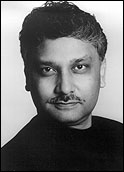A tale of drugs and deception
Kunal Basu has only won one award for his writing -- so far. His nod for best journal article from the Academy of Marketing Science in 1994, for a piece on customer loyalty, might have been a sign of things to come.
 Trip to Thailand inspired Kunal Basu's new novel The Opium Clerk
Trip to Thailand inspired Kunal Basu's new novel The Opium Clerk |
|
His latest creation is far less academic -- The Opium Clerk is set in the late 19th century when trade in the addictive "mud" ruled the Far East. Spanning two generations, several decades, and much of Asia's geography, the novel traces the opium trade from the fields of India to the smoky dens of the Chinese treaty ports.
Still -- despite the book's subject, an addictive drug, being the ultimate guarantor of customer loyalty -- Basu says that writing and his day job as a business professor are fairly separate parts of his life.
"I don't see my academic life and the literary one to be convergent or conflicting," he says. "Of course, it throws in a surprise or two when people find out, but I can live with such a reputation!"
Basu splits his time between McGill, where he contributes to the International Master's Program in Practicing Management and works on course development, and Oxford. He currently resides in England. The Opium Clerk was written and researched here -- much of his background material coming from old folios in the Osler Library of the History of Medicine.
Basu says that while he was naturally interested in the business aspects of the opium trade, his real inspiration for the novel came from a trip he took to Thailand. There he stumbled over a book on the opium trade, from which he was surprised to learn that Calcutta, his hometown, was a major centre for trade in the drug.
Having already published some poetry and a short story in London Magazine in 1997, Basu set about mining the opium trade for his story.
His protagonist for much of the book is Hiran, a high-caste Hindu who breaks with Brahmin tradition to work as a clerk with a British auction house that trades in opium, much of which is shipped to China.
Hiran falls into the orbit of the Machiavellian Jonathan Crabbe and his wife, a mysterious addict. Hiran gets drawn into the Crabbes' conspiracies -- finding them a son, acting as a go-between with Chinese rebels -- but he never becomes a part of them, never fully understanding events around him even as he is central to them.
This is partly allegorical -- under the rule of an often-oppressive colonial regime, India itself was often unaware of its part in the larger scheme of the British Empire. Hiran's passivity throughout the novel is much like India's status as a subject nation at this time.
"Indians were kept ignorant about British designs in China. Colonialism creates horizontal silences, so the subject races are ignorant of each other while being aware of the master," says Basu. Even more than half a century after India's independence some silences are only now being broken -- Basu's book is the first by an Indian writer to take place, even partially, in China.
It is tempting to make comparisons between Basu and other expatriate writers from the sub-continent that have found their home here, such as Rohinton Mistry or Michael Ondaatje, but Basu brushes aside the idea.
"I do see myself as part of this cultural crucible that has continued to nourish me. It is, however, important to remember that all writers of the sub-continent don't write similarly, they are not a part of a particular genre, and that one shouldn't fall into the trap of stereotyping them."
Part history, part allegory, The Opium Clerk is also something of a 19th century romance -- populated by pirates, beautiful maidens, wild sailors and seers (the book contains a fortune-telling duel between Hiran and a Muslim holy man).
Basu's first effort has earned him almost entirely favourable reviews -- the Times Literary Supplement called it "a novel of rare assurance, imaginatively set and richly textured...."
Basu hardly needed the encouragement. His second novel is already written. Titled The Minaturist, it is also set in India, but three hundred years earlier than The Opium Clerk.
Can we expect Basu to return to Montreal -- perhaps as an English professor?
"Fiction is my first love," he said "I still can manage a bit of time to do other things."

